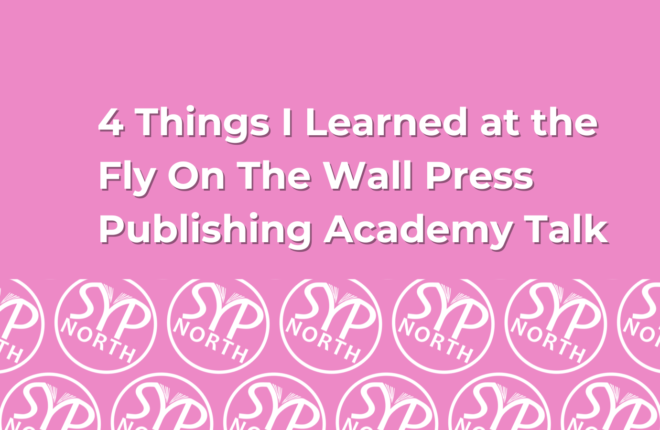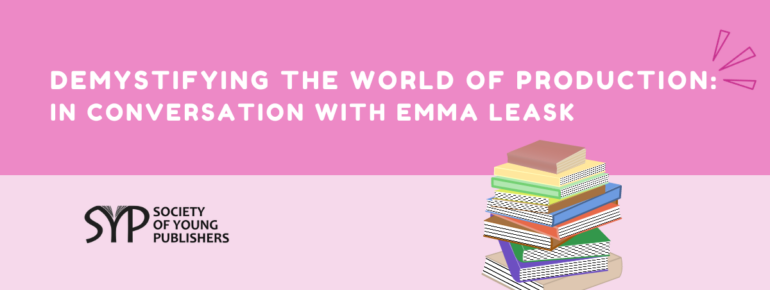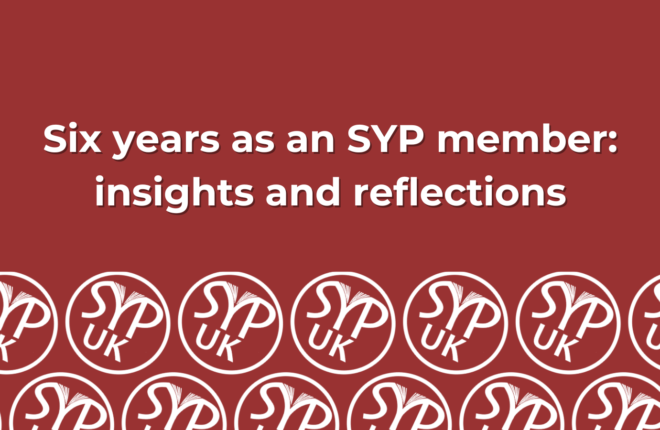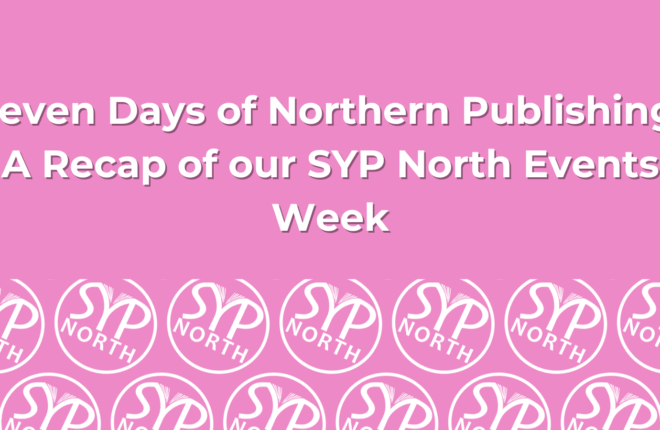
Demystifying the World of Production: in conversation with Emma Leask
Posted on September 18, 2023 in North, UK

If you have ever found yourself wondering what a role in production entails and how can you land yourself a role, you’re in the right place. We had a chat with Emma, chair of SYP North, who has recently secured a role as Publishing Assistant at Bloomsbury Academic, and she’s here to lift the curtain on this often-misunderstood position. Read on for Emma’s insights, invaluable tips and get ready to navigate the world of production!
It feels as though, at least from the outside, production can be a bit mysterious. How much did you know about production, or the production assistant role in particular, before beginning your job search?
I agree with you, I think for that reason it often gets overlooked by people wanting to get into the industry! I knew quite a bit about production before starting the job because it’s the department I always wanted to work in. I attended a publishing conference hosted by MMU and Comma Press in 2021 and there was a production session with someone who worked at Hachette, and I instantly knew it would be the perfect department for me. It’s a lot of organisation and time management, which is something I really enjoy. I then started researching more into the department, and when doing my Publishing MA at York St John University I learnt even more about the work done in production. It’s sometimes difficult to understand the role from the job description alone, but when researching into them before applying for jobs I realised that the production assistant role is fairly similar in every publishing house, which meant I could really tailor my CV and cover letter to those roles regardless of where I was applying.
People who take on production jobs within the publishing industry need to be good communicators and demonstrate excellent time management skills when working to deadlines. Where did you obtain administrative and organizational work experience and how much of it was related to publishing directly?
By volunteering with the SYP! I started out as a communications officer but then was asked to step up to the role of Chair last year, which I discussed a lot in my interview for the role. As Chair, communication is a really important skill when listening to my team and telling them important information from the UK Chairs or when work needs doing. I also need to oversee the work of each sub-team within the committee, making sure for example the communications team know when to post about events or any mentorship news. Outside of this, myself and a colleague from my MA set up our own independent publishing press to produce an anthology. This was a really great way to develop my organisational skills, because we were managing the entire publishing process ourselves. We had to make sure all the pieces were edited and typeset with a completed cover by the time the book was published, all whilst remaining active on our social media pages. It was this project management experience which was useful in my interview because a large part of production is being aware of the work of the other departments and making sure their work is organised on time for publication day.
Production assistants are often expected to be familiar with leading publishing software to create high-quality visual book materials, such as cover designs and typesetting. Prior to your application, how knowledgeable were you with Adobe or other design software? For those looking to develop their skills, what resources would you recommend?
I was fortunate to have had Adobe In Design sessions during my MA, as we produced a collection of short stories and poetry called the York Literary Review. I think without that, I wouldn’t have had the chance to use that software. For my role, I don’t use Adobe In Design as typesetting is done out of house, so it really depends on the company you’re working for and what exactly the production assistants do. I don’t think it’s necessary to use those pieces of software in particular to stand out in a job application, I think it’s more important to show that you’d be a quick learner and adapt to new software quickly. If you’ve worked in retail, you could show this by having learned how to use the till. It’s more about your skills and competence with learning the new systems rather than knowing them in particular before you start because the role is still entry-level so in theory you don’t need specific publishing experience.
Although the publishing job market can sometimes feel like a bit of a closed book, there are so many different avenues into the industry, and an abundance of job titles to go along with them. What was it about the production department that caught your interest? Has production always been the area you wanted to go into or was there a turning point that changed your mind?
I think the main thing for me was that the role is so reliant on being organised. I just love spreadsheets and lists, which you’ll definitely also need to love if you want to work in production! I’m also one of those people who refuse to crack a spine or dog-ear a page because I’m a bit of a perfectionist about the look of a book, which is definitely something central to a production role. Especially if you work for a trade publisher, or a children’s books publisher, where the physical aspects of the book are important for catching the eye of a consumer. I think another aspect of production was that you could work with people outside of your department and feel more connected to the publishing process as a whole rather than working on just one aspect. You’ll have to talk to editorial about things like the budget for the book or they might have corrections that need to be made for reprints, and the sales team may get in touch when you’re asked to cost the production of books. Production was always the department I wanted to work in for those reasons, but of course, as for most people, I initially thought editorial would be my dream department! It was only when researching more into production that I realised that it would be my perfect job.
Production vacancies are some of the most technical jobs in the publishing industry. What does the typical day in the life of a production assistant look like, and what are some of your typical work activities? What meetings do you normally have?
For me, I have my own list of backlist titles that I work on the reprints for. Every day is different, but there are certain tasks that need to be done on certain days, primarily because there are external people we work with who need to know when they need to print certain books. When working on titles that need to be reprinted, I first have to make sure it is financially viable for the company to do so, by sending the sales team a profit and loss sheet summarising the main costs involved in printing that book. If they approve the book to print, that begins the cycle of preparing the book to be reprinted. I’ll mark up the text with any corrections that need making, either submitted to me by editorial or if there are updates to the imprint page at the beginning of the book. I’ll be in touch with designers to make sure they update the cover for the reprint, making sure the ISBN is correct and that the edition number on the barcode is the right one. Once the book is completely ready to be printed, I’ll email the printers and let them know when it needs to be printed. Alongside this are various other tasks that might pop up, for example, if a book needs to be made print–on-demand I run the costs to see whether it’s viable, and then if it is will make the text and cover ready for POD. I work on the Drama and Performance Studies list, which sometimes means urgent reprints come to me that need to be delivered to a theatre showing that play or show, which often requires speeding up the processes and some negotiation to make sure everything is ready on time. I personally don’t have many meetings, it’s a fairly independent role, and considering I’m working on backlist books, there’s not the usual amount of discussions to happen compared to a frontlist title that has never been published before.
Since starting the role, what would you say is your favourite part about the job? Has this changed at all, or is this different from what you expected it to be?
My favourite part is definitely different from what I expected because it’s when I have urgent reprints to do! These can feel quite high-pressure situations where everything needs to be done quickly, and if you’d told me about that part of the job before I’d started, I would have imagined it to be quite stressful. But, when everything comes together and the book is all ready to be printed and delivered on time, it’s the most satisfying feeling! I think that’s definitely the organization-loving part of me because it definitely does take a lot of careful checking and time management to make sure each part of the process is done by the time the book needs to be sent to the printer. When I had my first urgent reprint I did find it a bit scary at first, but once I became familiar with the processes, it has definitely become a rewarding part of the job.
What is one thing that you still don’t know, or are looking forward to learning on the job? Which aspects do you find the most challenging?
I’m looking forward to learning more about the process of producing frontlist titles, in particular, the stages after the book has been edited and is being typeset and produced into an actual book for the first time. Similarly, I’m excited to be the person who decides the specifications of a book before it is printed for the first time, for example choosing the paper or the finishes on the cover. There are some aspects of the job that are still challenging because I still feel very new (I started on 1st August this year), so I think it’s just parts of the job that I haven’t experienced as much or knowledge which isn’t immediate yet. For our print-on-demand work, I sometimes struggle with remembering the processes for this, mainly because my primary focus is reprints which follow a different process.
What would you say are the most common misconceptions about your job? Did you have any of these before starting?
The biggest misconception is probably that production is boring! I think it’s hard to understand exactly what the production department does without experiencing it for yourself, but in reality, the job is really diverse as each title has different requirements, and various questions and tasks pop up that you don’t expect. I honestly never know what might come up as I start work in the morning, which I do really like about the job. I think the main misconception I had related to that is thinking I’d be doing fairly similar work each day, and whilst there are the same weekly tasks to complete, they are so varied because each book is so different, or suddenly an urgent reprint will come up that I need to focus on. I think people also don’t often understand how important the production department is to the publishing process. Without us, the books just wouldn’t get printed, especially not in time for publication day! We’re right at the end of the process, but we make sure that everything that goes into making a book is done to the highest standard and by the important deadline. Overall, I think production is just as exciting as editorial or marketing, which typically are seen as the more fast-paced departments.
If you could give one piece of advice to someone looking to get into production, or to hopefuls trying to get into publishing in general, what would it be?
My main advice is to get involved with as much as you possibly can that gives you access to the publishing world. Whether that’s being active on publishing social media, writing for The Publishing Post, hosting your own publishing podcast, and of course volunteering/engaging with the SYP. Any way you can show a genuine passion for publishing and wanting to work in the industry (aside from just loving reading, which I’m afraid isn’t enough!), will set you ahead of other candidates. For production in particular, try and attend any production-related events or talks as possible as they come up and maybe even research the technicalities of the production of a book so that in your cover letter and interview, you can show a passion for the department. A lot of people will apply for production with the aim of transferring to another department, so if you genuinely want to develop your career in production, you need to demonstrate your genuine enthusiasm for the department.




 Listen to the podcast
Listen to the podcast  Explore the Youtube channel
Explore the Youtube channel